
Liberty Gladden heads to South Korea, thanks to her award
UMKC student Liberty Gladden has been selected as a winner of a 2024 Boren Scholarship. Gladden, a junior studying computer and information sciences with a minor in business, will receive funding to pursue intensive Korean language study at a university in South Korea in Fall 2024.
Gladden is currently studying abroad at Hanyang University in South Korea, and this opportunity will allow her to return to the country for another semester and further cultural immersion. Gladden’s future goals involve pursuing her Master in Business Administration at UMKC and eventually working as a leader within the U.S. government.
The Boren Awards is a highly competitive national award program, which provides up to $25,000 in funding for students to study language and culture abroad.
The program aims to provide students with the resources and encouragement necessary to acquire skills and experiences in areas of the world critical to U.S. national security. In exchange, recipients accept a service requirement to work for the federal government for at least one year after the completion of their program.
Recipients are chosen based on the relevance of their country and language to U.S. national security, their commitment to long-term government service, demonstrated academic preparation and cultural adaptability.
“I’m excited for this award to help impact my future by allowing me to carry out my career goals on a global scale passionately,” Gladden said. “This opportunity will help me achieve mastery in Korean, which will enable me to further be of service to the Korean people and aid in U.S.-South Korea relations. It is a blessing to be given this opportunity and I credit it to the hard work put in by not only myself, but also so many others who have helped me along this journey such as my UMKC Competitive Awards Advisor McLain Hymer and even professor Alex Matlack.”
Gladden discovered the Boren Awards thanks to Hymer.
"When Liberty and I first met, she had never heard of the Boren Awards before, but it quickly became apparent that this program would be a great fit based on her interest in the Korean language and a future career path within the federal government,” said McLain Hymer, manager of nationally competitive awards at the UMKC Career Services. “I am excited to hear about how this opportunity for cultural immersion will help Liberty continue to enhance her Korean language skills and further her personal and professional development.”
UMKC Career Services offers career development and resources for UMKC students and graduates, such as help with applying for competitive awards to further academic and professional interests. They also offer opportunities for employers to connect with talented students and alumni.
“I am excited to continue working with UMKC students of all academic disciplines as they pursue nationally competitive award opportunities,” Hymer said. “The experiential learning opportunities offered through programs like Boren are amazing ways for our students to deepen their understanding of the world around them and reflect on their goals for the future.”
May 31, 2024
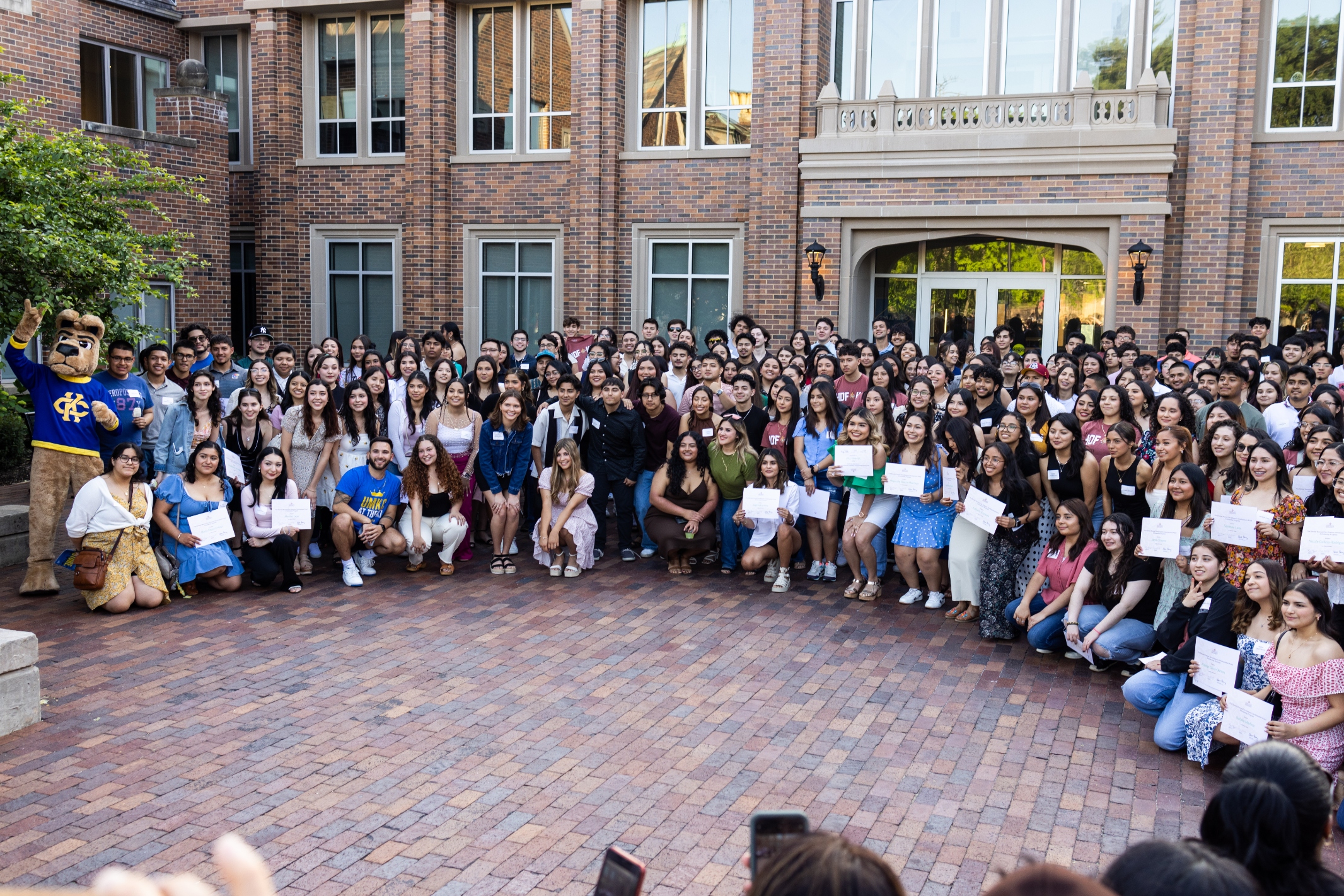
Campus event at Henry W. Bloch School of Management honors hundreds
The University of Missouri-Kansas City is once again a top choice for high school and returning students who received Hispanic Development Fund scholarships for the next academic year.
This year, the Greater Kansas City Hispanic Development Fund awarded a record-breaking $1.2 million dollars in scholarship funds to 509 recipients. Of those, 125 represent new and returning scholars at UMKC.
The Hispanic Development Fund (HDF) awarded its first scholarships in 1984, providing $100 each to 100 students through a separately named Hispanic Scholarship Fund.
UMKC hosted the scholars and their families at the Henry W. Bloch School of Management for the second straight year. Lauren Orozco (B.B.A. ’23) played a large role in organizing this year’s event. As a former HDF scholar, she understands the lasting impact this scholarship program can have.
“The Hispanic Development Fund gave me a valuable and connecting community that helped prepare me for life after I graduated,” said Orozco, who now serves as an admissions counselor at the Bloch school. “That is the lasting mark the Hispanic Development Fund has on their students. They aren't just providing them a scholarship but with a community that will continue to grow and give back.”
During this year’s event, students received detailed information about their opportunities and the partnering organizations, but one of the most important elements of the event was the opportunity for the students and their families to celebrate their success.
Marlon Perez-Morales is a sophomore studying business administration with an emphasis in finance.
“The connections I’ve made through HDF have made a big difference early in my college career. I’m also involved as a mentor and can tell other students about HDF and give back to them.”
Phillip St. John is a senior studying business administration with an emphasis in entrepreneurship. He’s also a second-generation HDF scholar. His father, and UMKC alumnus, Steven St. John (B.A. ’96) was also an HDF scholar and now hosts the popular sports morning show “Border Patrol” on 810 WHB. Knowing the impact HDF can have, he pointed his son toward the program.
“I’ve been an HDF scholar each year here at UMKC,” the younger St. John said. “The financial assistance has been important but the connections I’ve made through this program have had the biggest impact.”
Lilah Crum Barnhill is a junior studying philosophy and French.
“The Hispanic Development has given me an amazing community support system,” Barnhill said. “Receiving this continued financial support as a returning HDF scholar has ensured my success here at UMKC.”
May 31, 2024
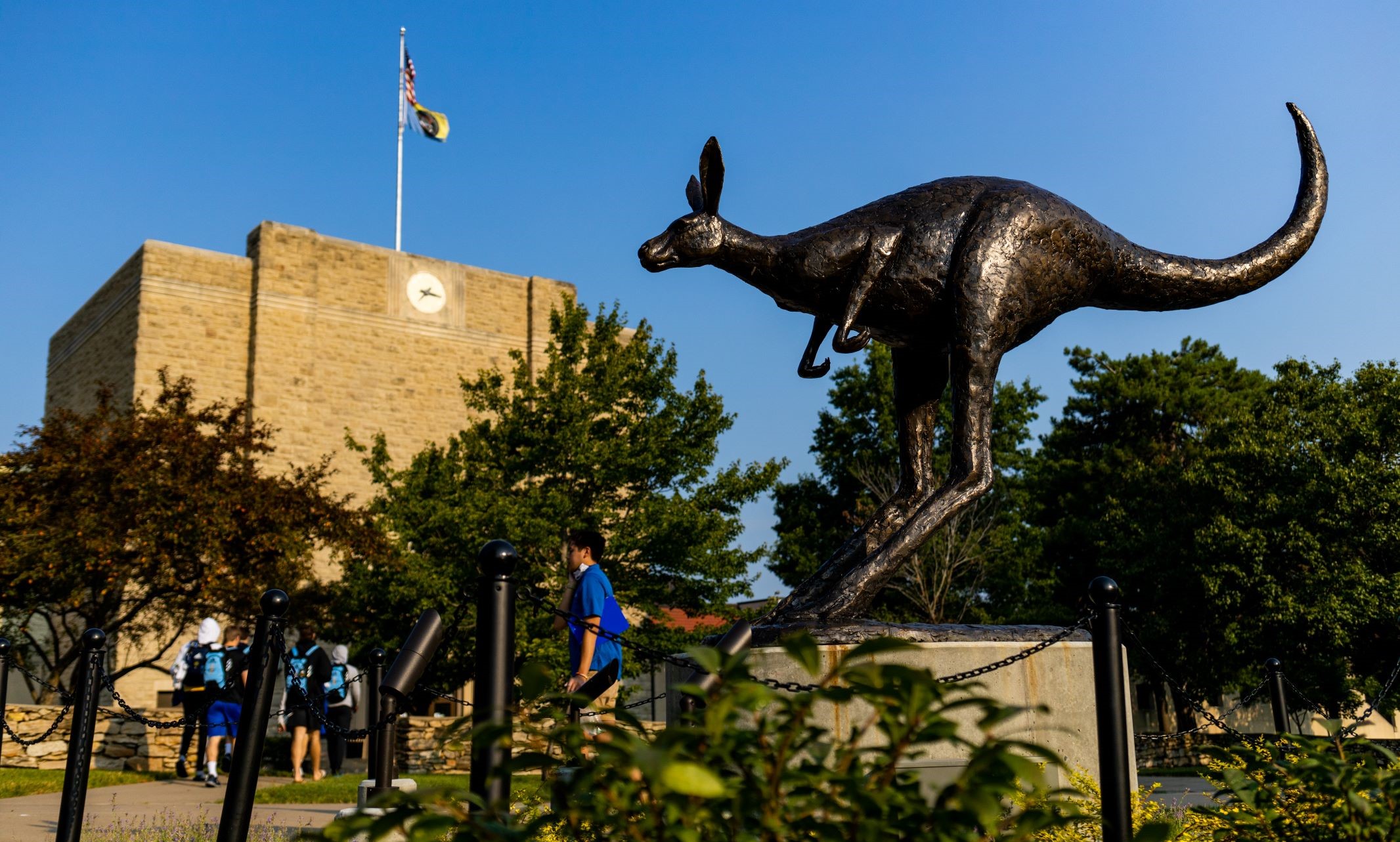
One alumnus was featured in the article discussing the return on investment of a bachelor's degree
The University of Missouri-Kansas City was featured in a recent story from the The Wall Street Journal. The story discusses the colleges where students are most likely to see a positive return on the investment of a bachelor's degree.
The journal found that "young professionals graduating from public universities charging in-state tuition often receive a degree that is worth the money—with one caveat. New graduates need to earn at least $50,000 a year, on average, in their first decade off campus for the degree to pay off."
UMKC alumnus James Maiden spoke with The Wall Street Journal about his salary and job experiences before and after receiving his bachelor's degree.
James Maiden (B.L.A. '19) was quoted in the Wall Street Journal about the return of investment on a college degree. Photo by Brandon Parigo | UMKC
From The Wall Street Journal:
"James Maiden, 32 years old, dropped out of the University of Missouri-Kansas City about a decade ago because he needed to make money. He held various jobs, including at a shoe store, before landing one as a marketing manager for a nonprofit theater in Kansas City, Mo., where he earned less than $50,000. It was tough to envision a career path.
'I was working in circles without a degree,' he said. 'I needed to go back.'
After earning his bachelor’s in liberal arts in 2019, Maiden got a job as a communication specialist for a construction company. He now makes almost double what he earned at the theater."
Read the full story from The Wall Street Journal (subscription required).
UMKC has numerous scholarships and programs to make college affordable for all. Learn more about them.
May 29, 2024
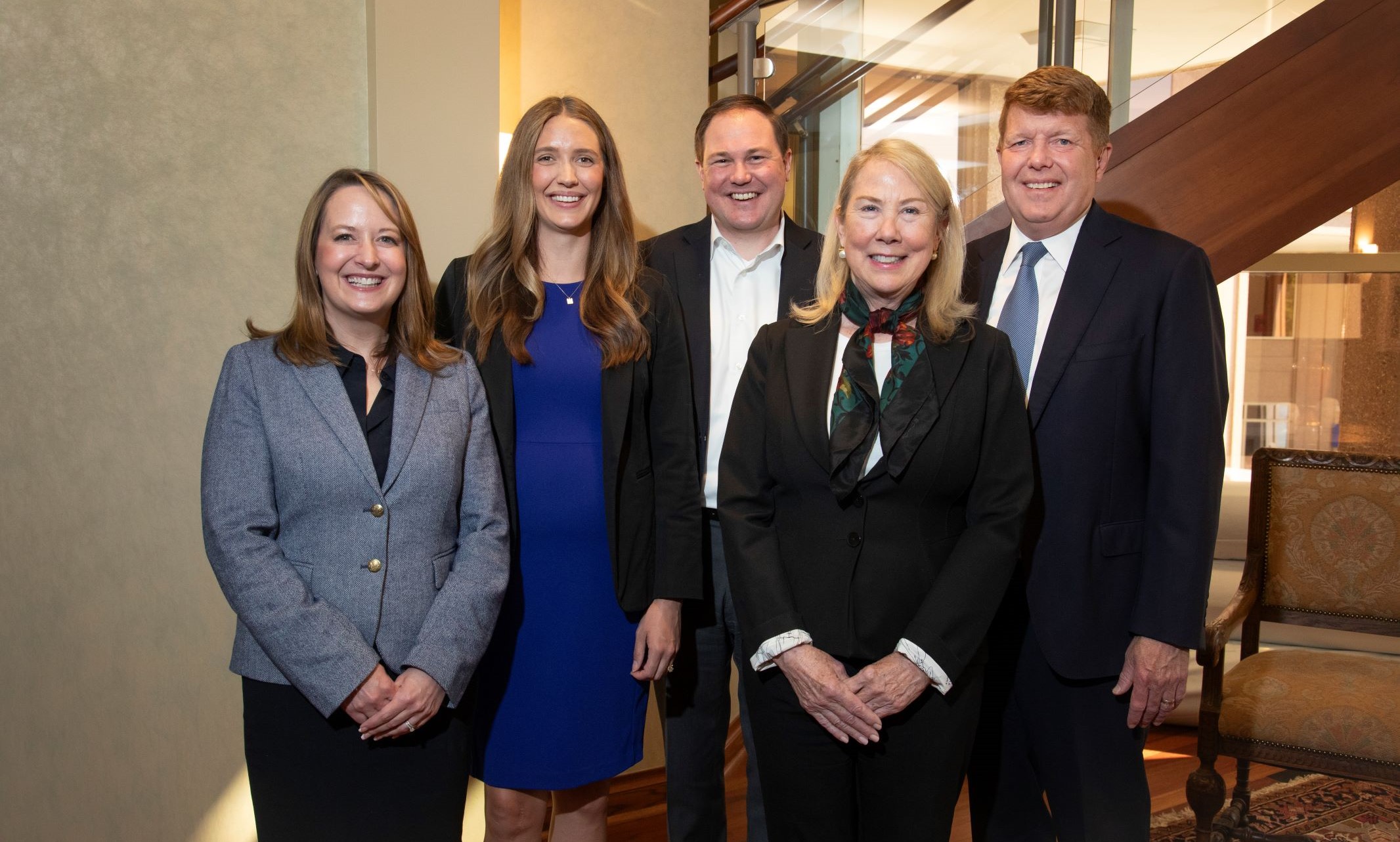
The gift from Wagstaff & Cartmell will provide free bar preparation to UMKC School of Law students
Wagstaff & Cartmell, a litigation law firm in Kansas City, made a five-year, $250,000 commitment to the University of Missouri-Kansas City School of Law’s bar preparation fund. Their gift supports an initiative by the law school to provide a commercial bar preparation program and in-person supplemental course at no additional cost to students.
As of December 2023, every UMKC J.D. graduate has access to these resources.
The stress of bar preparation is a feeling that many attorneys remember, even years into successful careers. Brian Madden (J.D. ’92) and Jack Hyde (J.D. ’11), both partners at Wagstaff & Cartmell, spoke about the importance of supporting students as they take this step in their careers.
“Many of us were fortunate to have support from the firms we were going to work for when it came to bar preparation,” Hyde said. “Not everyone has that support, and it can be a big obstacle. We knew this would be a meaningful way to give back to students that would help them the most.”
While some law firms will pay for bar preparation expenses, students with ambitions in public service and other areas of law will have to decide whether to pay the cost themselves, an average of $4,000, or choose to take the bar exam without that support.
“Recognizing that UMKC serves a very diverse economic student population, and given the current cost of bar preparation, we don’t want to see students forego it due to cost,” Madden said. “I cannot imagine taking the bar exam without preparation. It gives you a comfort level, both with the substance and the psychological stress. It’s so important that everyone has an opportunity to play on an equal playing field with regards to the bar exam.”
The commitment from Wagstaff & Cartmell is the first one by a law firm.
“We would love to see other mid-size and large law firms take this opportunity to support these students,” Madden said. “UMKC Law makes significant contributions to the Kansas City legal market, both at the public level through judges, prosecutors and defenders, and at the private level. There are a lot of very successful private attorneys in the city who graduated from UMKC.”
“The long-term success of UMKC is vital to the local bar and firms like ours based in Kansas City,” Hyde said. “A lot of students end up working in the community they graduate from, so having the school here is vital to Kansas City. It’s the only law school in Kansas City.”
Learn more about the bar preparation initiative at the UMKC School of Law.
May 29, 2024
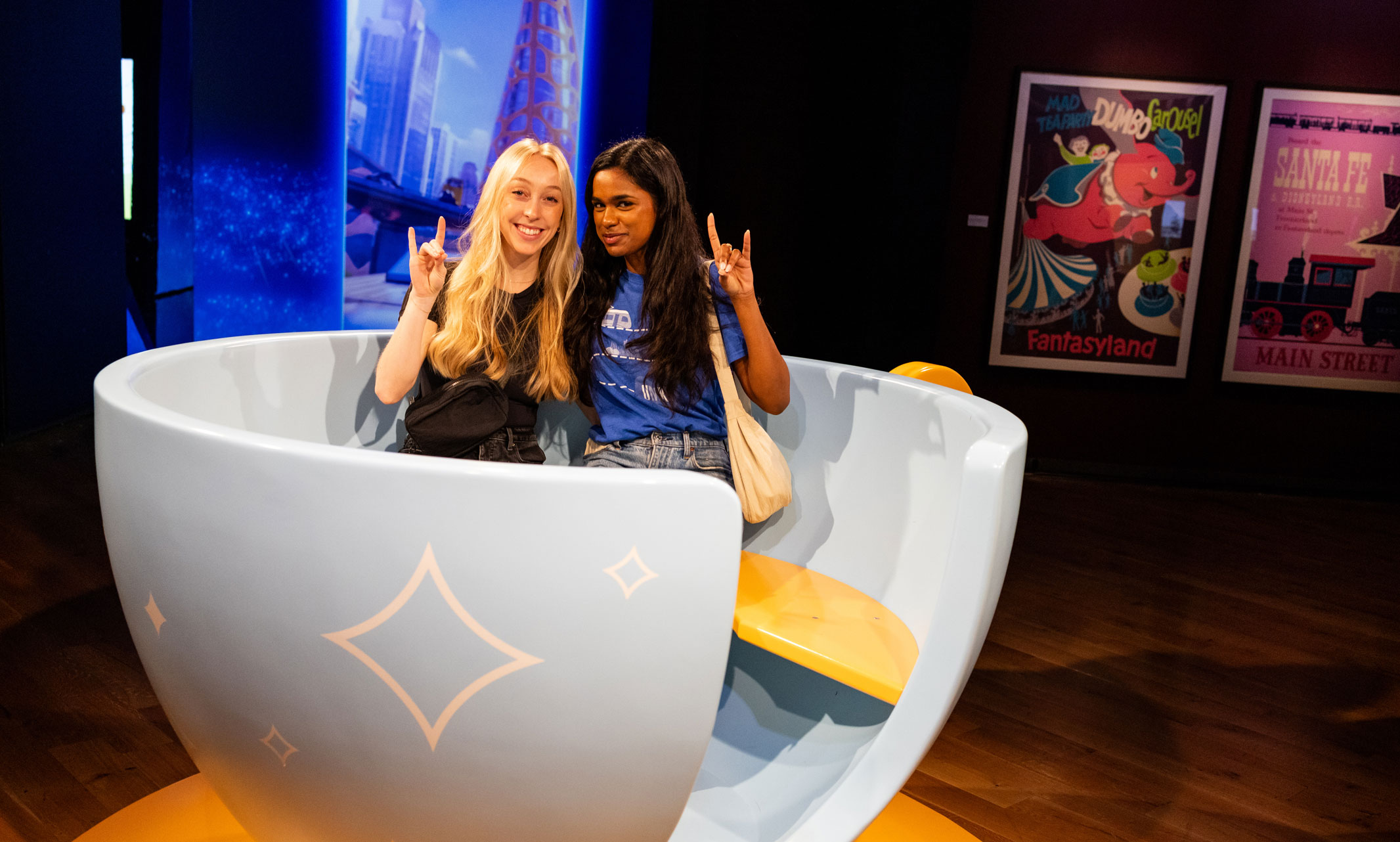
UMKC is a supporting sponsor of exhibit at Union Station
UMKC is a proud sponsor of the Disney 100 exhibit in Kansas City.
Now at the Bank of America Gallery in Union Station, the Disney 100 exhibit features more than 250 artifacts including works of art, costumes, props and other memorabilia from the historic vault of the Walt Disney Archives.
Kansas City and UMKC have a storied history with Walt Disney and his media empire. Perhaps most well-known, Disney is known to be the first illustrator of KC Roo, the university mascot. To celebrate this shared history, a special gallery is included exclusively for the Kansas City run of the exhibit to celebrate the connections.
“I’m not aware of any other college that can claim the most famous animator in the world drew their mascot. UMKC is singular in that respect.” said George Guastello (B.B.A. ’82, MBA ’84). “As a proud Kansas Citian and UMKC alumnus, it’s a thrill to have a special section, Union Station’s Hometown Connections Gallery, that honors Disney’s deep roots here in our community.”
In addition to the Kansas City gallery, Union Station, UMKC and Missouri Humanities Council have teamed up to present special programming for Disney fans to hear from the voice of Goofy and Pluto, learn about the experience of animators and discover a deeper understanding of Disney’s life and experiences in Kansas City and Missouri.
Join us for UMKC Day at Disney 100 on Oct. 19 for special UMKC presentations that are free after admission purchase.
UMKC professor David Trowbridge, Ph.D., will present Walt Disney’s Kansas City, a presentation and Q&A on Disney’s childhood and early career. Tickets are free on the Union Station website.
There is also a special maker activity with staff from the National Museum of Toys and Miniatures. Participants will explore the different versions of the UMKC mascot, including the one illustrated by Disney and sew their own stuffed kangaroo. Tickets are free on the Union Station website.
Emmy-winning alumnus Douglas Enderle (M.F.A. ’81) will present The Roo Behind the Magic about his career after UMKC. Note: Enderle is only presenting Oct. 19. Tickets are free on the Union Station website.
The exhibit is open until November 2024.
May 24, 2024
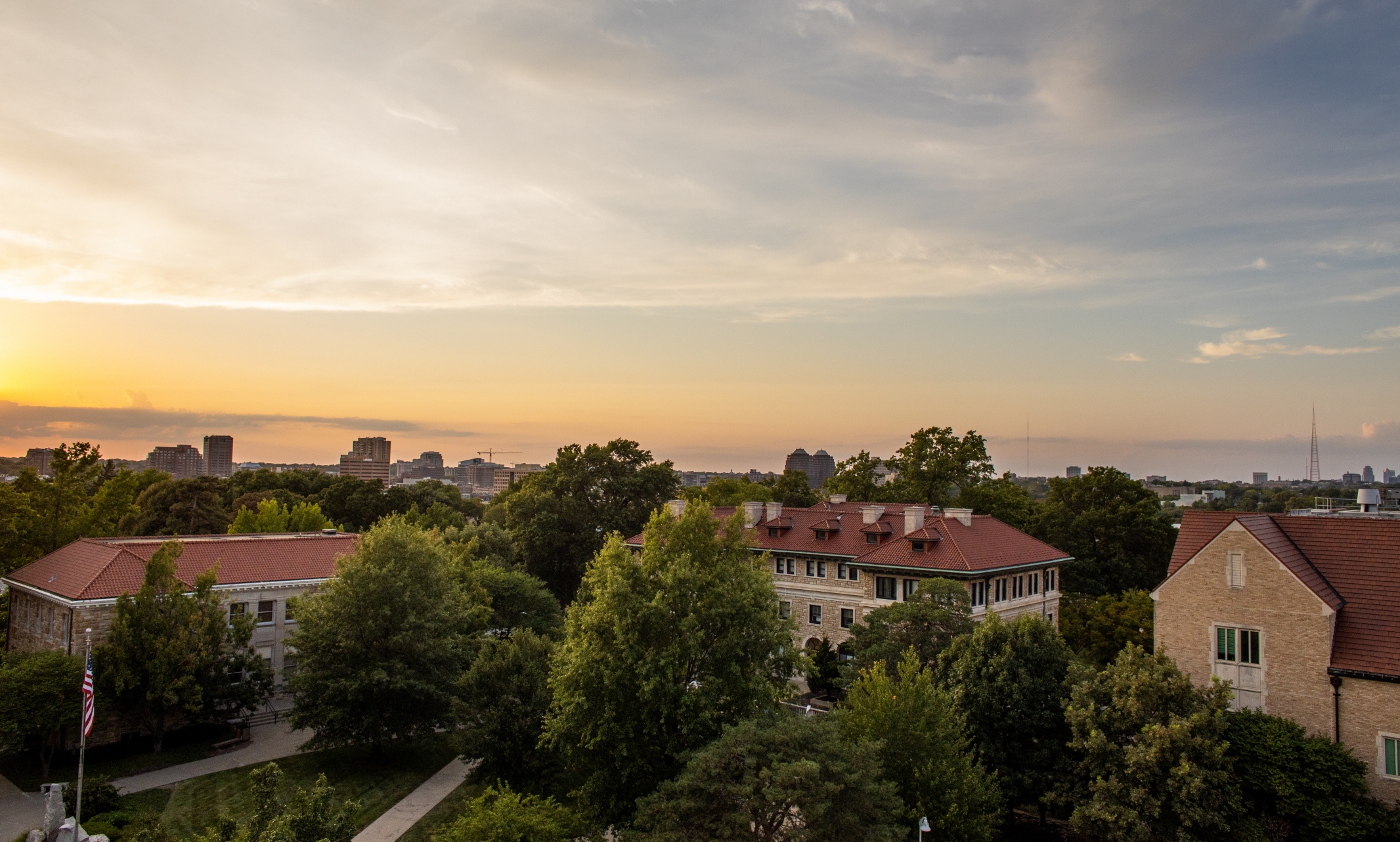
Recent investments in student success have resulted in increased retention and graduation rates.
The University of Missouri Board of Curators today approved tuition rates for the 2024-25 academic year.
The new rates maintain UM’s reputation for being a top value in higher education nationally and allow the UM System to continue investing in student success. Since 2018, UM’s strategy for investing in student success has resulted in historic highs in retention and graduation rates. Over the past five years, the university’s cost per degree has fallen 11% when compared to inflation. Undergraduate tuition at all four UM universities will rise 5%. Graduate and professional tuition increases will range from 3% to 5%. Details will be available at each university’s website later today.
University of Missouri-Columbia: https://cashiers.missouri.edu/
University of Missouri-Kansas City: https://www.umkc.edu/cashiers/tuition-fees/
Missouri University of Science & Technology: https://sfa.mst.edu/cost-estimates/
University of Missouri-St. Louis: https://www.umsl.edu/sfs/tuition-fees/index.html
Even with the increases in tuition and fees, the cost of education at UM universities is significantly less than the national average. Additionally, the UM universities continue to outperform their peers related to retention and graduation rates, as well as post-graduation success, which is a measure of how many students achieve their post-graduation goals within six months of graduating. In 2023, more than 95% of UM students graduating achieved their post-graduation goals, nearly 9 points higher than the national average.“We are proud to support student success by providing a world-class education at an exceptional value,” University of Missouri President Mun Choi said. “Our students are completing their degrees on time and with the experience needed to launch great careers right away. The tuition increase will ensure that we keep delivering results that change lives and support the economic development in Missouri.”"As curators, we have two key guideposts when we consider tuition," said Robin Wenneker, chair of the UM Board of Curators. "First, we must be financially responsible fiduciaries of the university. Second, we must do all we can to provide an extraordinary educational experience that will position our graduates for immediate and long-term success. We are meeting both of these important objectives with today’s announcement and look forward to a promising 2024-2025 academic year at all UM universities.” The tuition increases will continue to provide funding to:
Invest in more course sections
Invest in more advisors
Invest in more faculty
Invest in more tutoring support
Invest in new classrooms and laboratories
Invest in new instruments
Invest in research opportunities
May 23, 2024
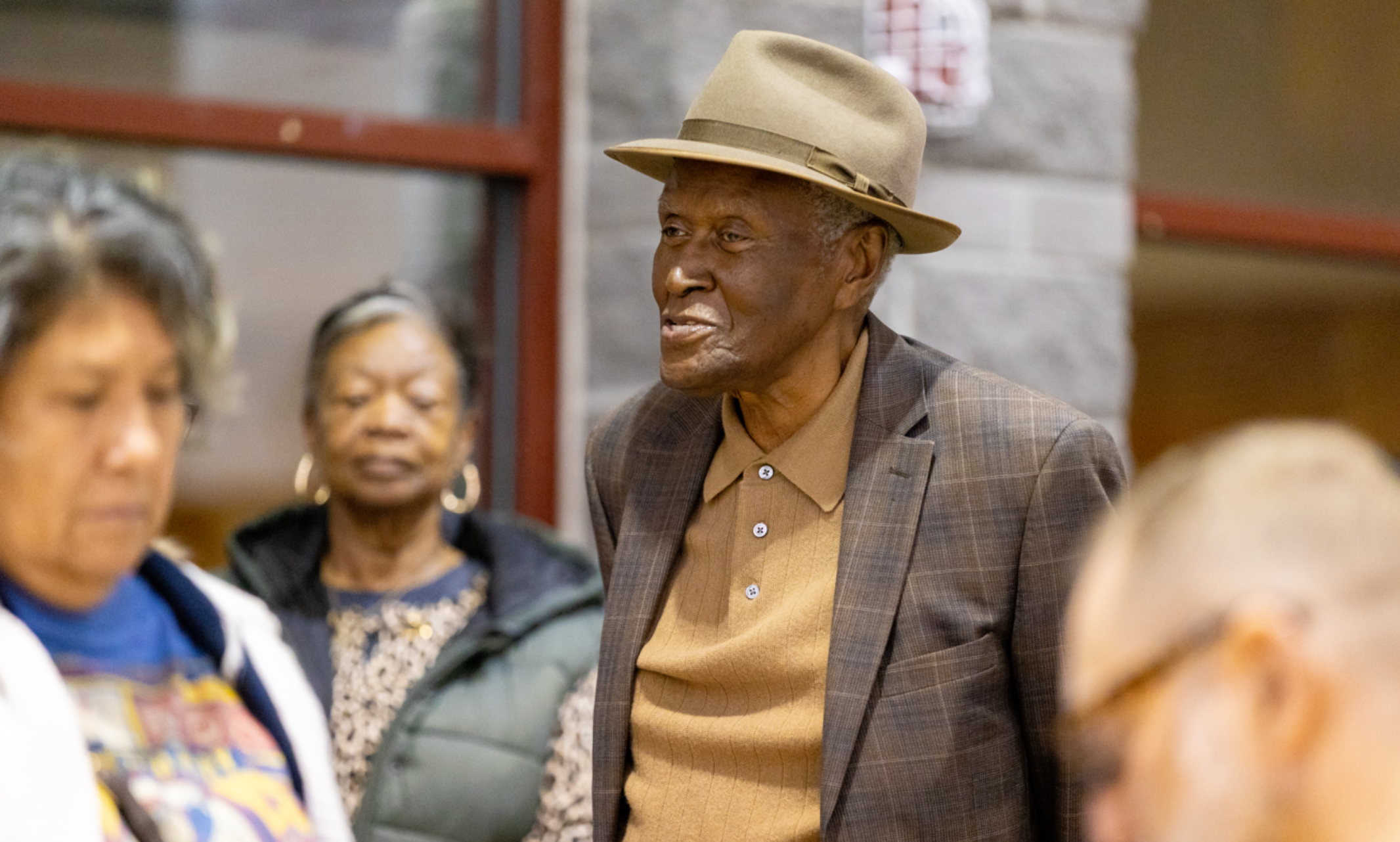
Kansas City’s very own civil rights hero shares his feelings about UMKC and giving back
Alvin Brooks (B.A. ’59, M.A. ’73) is a name many in the Kansas City community know. He has served as a police officer, councilman and has participated in many acts of public service, urban progression and civil rights. Brooks also had a scholarship named after him for more than a decade and received an honorary doctorate from UMKC in 2012. He has continuously made donations and gifts to UMKC in support of student life, student programs, services and scholarships for 14 years. He is also involved long term with the university’s Institute for Urban Education as an advisory member to this day.
I heard there is a movie coming out about you based off your memoir, and it is directed by Academy Award-winning director, Kevin Wilmott. How did that come about?
Yes! The movie is coming out on Juneteenth, and it is based off my memoir, Binding Us Together. Kevin read it and reached out, saying that he was interested in turning it into a documentary. I wasn’t going to say no to that! I’m excited. Kevin is a great guy and a lot of the scenes from the book will be discussed and shown.
How did you feel when you were named Alumnus of the Year in 2009 and then received an honorary doctorate in 2012?
Oh, I felt great! I didn't expect it, but I was confident about it. It made me think that maybe some of the things that I have done mattered. I am representing UMKC and got to see it grow throughout the years. I was genuinely surprised with an honorary doctorate because I didn’t really do anything to earn one! I’m just happy UMKC valued what I did enough to give me one.
How did you feel when you found out there was a scholarship named after you?
Again, I was extremely honored, knowing that there were people who wanted to give back using my name. Though I am still trying to figure out who were the ones that started it! I think I have a good idea who did it, I will let you know.
Alvin Brooks, on the right, smiling with Frank White Jr. and Jannette Berkley-Patton, M.A., Ph.D.
One of your scholarship preferences is for first-gen students, why do you think that is important?
I’m extremely pleased that being a first-generation student is a requirement. I think it's very significant and needed. The students who have resources to begin with are going to make it anyway, as opposed to those who struggle, who are the first one in their class or family to go to college or even the first one to finish high school. I’ve spoken about this many times. It is an incentive for those students. It will encourage them to push forward in their studies and create something for themselves. That is why it is important.
Why is giving back so valuable and important to you, and how does that tie with being a first-generation student?
I was completely on my own when I was an undergraduate. I had no help, and it was very difficult. I think meeting people that came from such different walks of life really opened my eyes. That is why giving back is valuable to me. I want to help students not have as hard of a time as I did. I also hope funded programs at UMKC attract different students and help first-time students meet a variety of people.
I know you are a humble man, Mr. Brooks, but are you aware of the impact you make toward our community?
No. Well, let me say this. I hope that I have made some impact. Especially in the areas of race relations and interpersonal relations. I'm a believer. Regardless of what your race might be. I think we should all be free and treated kindly. Not just in America, but all six billion of us. That is what I pursue and believe in, and I try to pass that down to my family and those around me. When I get the opportunities to do things, it makes me feel good. To know that people think I can do that. I’m not Moses or Dr. Martin Luther King Jr., but I am an honest man with integrity. So all I can say is that I hope that I have done well representing UMKC, and I am proud to have done what I did. I hope that when people talk about what I’ve done, they can relate to my humble beginnings. I struggled, but accomplished the things that are most important.
What role and impact do you think UMKC is making?
UMKC has become more prominent since my time being here, and I think the university has realized its role of an urban university. UMKC has become more aware of the community around it and has developed over time. There were only a handful of Black students when I was here in 1956. Now, it’s almost like the United Nations in terms of student population. There are still some issues, but I think there has been a consciousness on the part of the university and its higher administrative members, which will be passed on to the students in the classroom. That’s what UMKC is all about.
Learn More About UMKC Foundation
May 17, 2024

The agreement will provide new opportunities for research and collaboration
The University of Missouri-Kansas City has entered into a Cooperative Research and Development Agreement with the United States Cyber Command.
This partnership is set to transform the landscape of artificial intelligence and cybersecurity through collaborative education and research.
UMKC is the first university in the country to sign a cooperative research and development agreement with the United States Cyber Command. This partnership is also only the second to be signed by the command overall, positioning UMKC at the forefront of cybersecurity and AI research.
“This partnership represents a key milestone in demonstrating the technical relevance of UMKC and the Missouri Institute for Defense and Energy’s (MIDE) faculty, staff and students,” said Travis Fields, Ph.D., interim director of MIDE. “We are excited to work on research and development cyber solutions for the Department of Defense.”
UMKC has also entered into an Educational Partnership Agreement with the United States Cyber Command, which aims to enrich UMKC students' learning experiences by providing them with access to internships, guest lectures and state-of-the-art research facilities. UMKC is excited to play a key role in training future leaders of the AI and cybersecurity workforce.
By combining the university’s academic and research excellence with the United States Cyber Command’s operational expertise to drive innovation in artificial intelligence and cybersecurity, this partnership also serves as a collaborative framework for joint research projects. The collaborative efforts are expected to lead to the development of advanced solutions to tackle complex cybersecurity challenges, benefiting both national security interests and the broader field of technology.
May 15, 2024
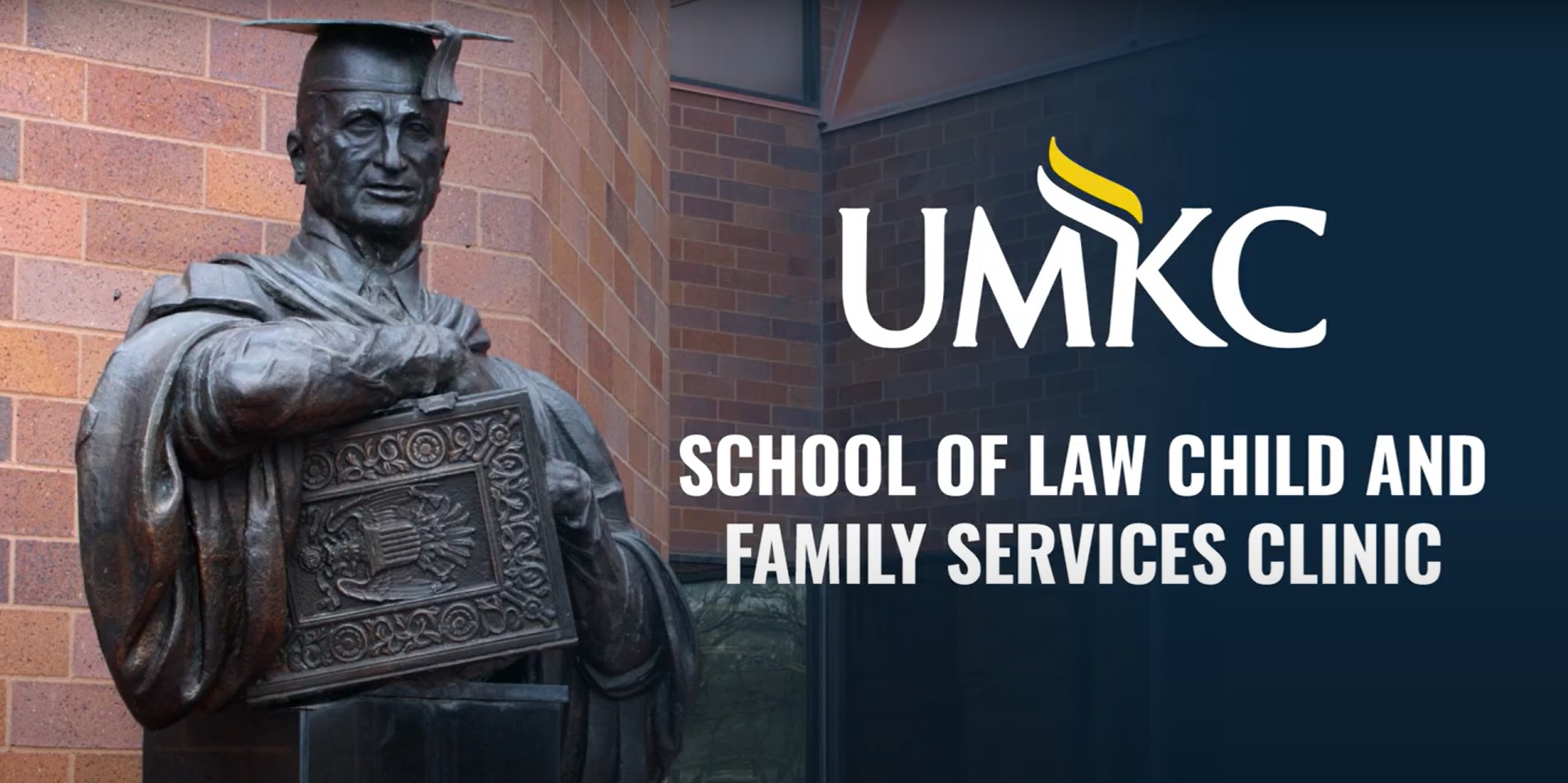
School of Law clinic provides valuable experience while helping community children
Family legal issues are one of the largest unmet needs in the state of Missouri and in Jackson County. The UMKC School of Law has helped to fill that gap since the opening of its Child and Family Services Clinic in 2000. Since then, the clinic has helped more than 1,000 children be placed in permanent homes.
Clinic director Wendy Ross, J.D., joined UMKC just one year ago but has already been impressed with the impact the clinic has made.
“UMKC has a heart for providing for the community,” Ross said. “They want to reach out and help, all while providing valuable experience for our law students.”
Under the guidance of professors, work in the clinic is done by students studying family law. Services can include representation in court, paperwork to establish guardianship and more. Students at the clinic provide an average of 2,000 hours of service a year, all free of charge to the families.
“This important service to our community is why we chose to highlight the UMKC School of Law Child and Family Services Clinic in a video,” said Curt Crespino, vice chancellor of UMKC External Relations and Constituent Engagement. “The pro bono legal services changed the life of Brittney Hallman’s family and so many others in the Kansas City region.”
Brittney's story and her experience with the clinic were featured in a story on KSHB 41.
The most common service provided is establishing legal guardianship of children, often to the father or grandparents. Without legal guardianship, a caregiver does not have the authority to properly care for a child, including to enroll them in school or make medical decisions.
The clinic serves parents and families who qualify at or under the national poverty guidelines. Services are provided pro bono, allowing people who may not be able to afford a lawyer help navigating the legal system. Clients can be referred to the clinic through family court, nonprofit agencies and other organizations, as well as through direct application. For more information and to have a case considered, call the clinic at 816-235-6336 and complete an intake form over the phone.
May 14, 2024
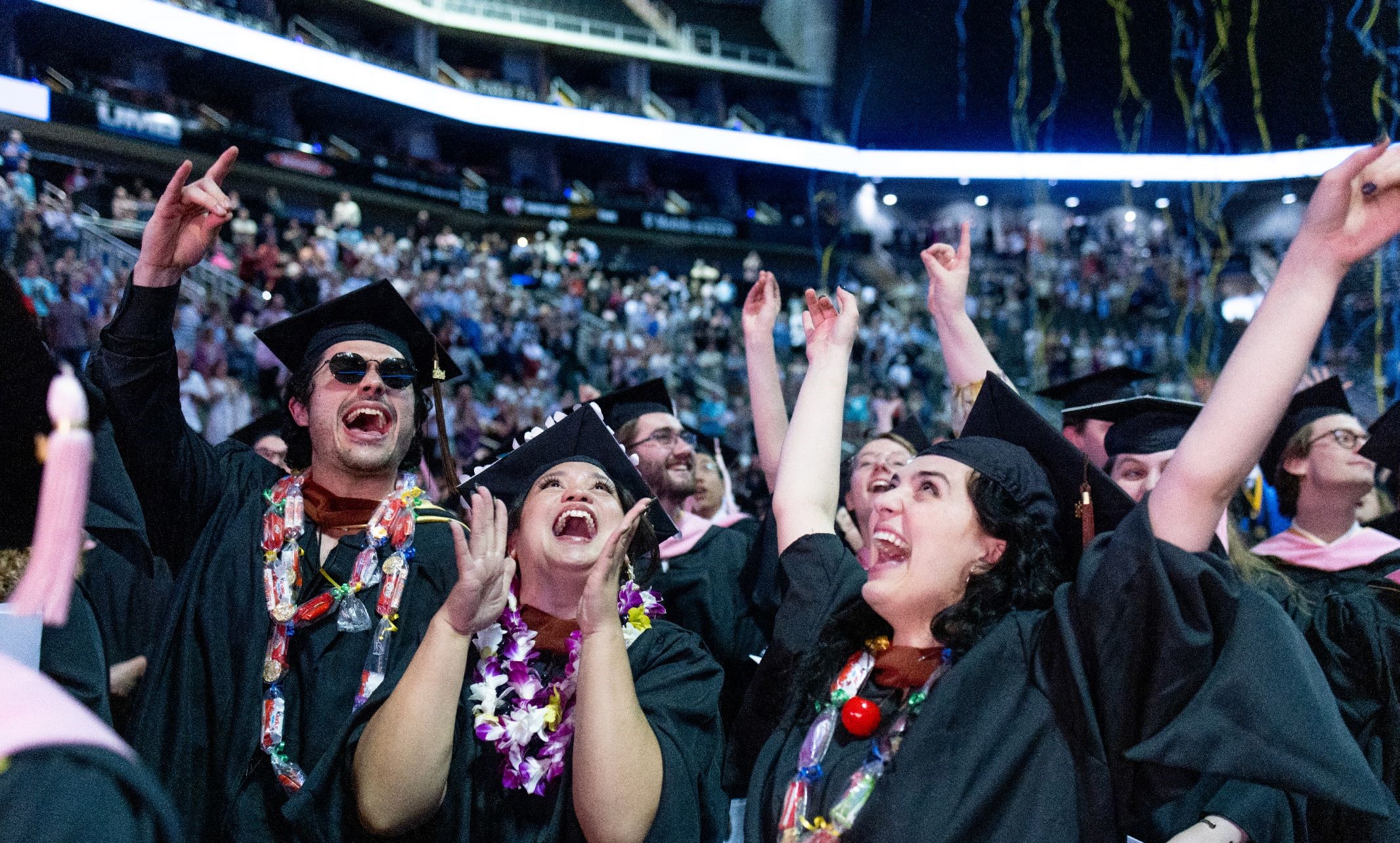
Kansas City Mayor Quinton Lucas and Leigh Anne Taylor Knight of the DeBruce Foundation were the keynote speakers
More than 2,600 degrees were conferred on Sunday, May 12 during the University of Missouri-Kansas City Spring Commencement ceremonies.
"Some of you came to UMKC knowing exactly where you were headed," said UMKC Chancellor Mauli Agrawal. "Some of you might have had no idea what you wanted to do. But all of you have chosen your own individual path and arrived here your way. You have overcome challenges and celebrated triumphs that have shaped you into the person you are today."
There were two Commencement ceremonies. Kansas City Mayor Quinton Lucas was the keynote speaker for the first ceremony, telling graduates to be confident and strive to do their best.
"Each and everyone of us should strive in some way to be famously excellent in whatever it is that we have to do ahead," Lucas said. "As you leave this arena today, know that we support you, that we believe in you."
Leigh Anne Taylor Knight, an alumna of the UMKC School of Education, Social Work and Psychological Sciences and UMKC Trustee, is executive director and chief operating officer of the DeBruce Foundation. She delivered the keynote address for the second ceremony.
“Your achievements today not only represent your hardworking and dedication, but also the unwavering support of those surrounding you today.,” Taylor Knight said. “I encourage you to find your purpose through curiosity, courage and kindness.”
Following the ceremonies, graduates flooded the T-Mobile Center to take photos and celebrate with their loved ones.
Commencement took place on Mother's Day. A few graduates celebrated the occasion by walking across the stage to receive their diploma with their children, several of them carrying them in their arms.
May 12, 2024
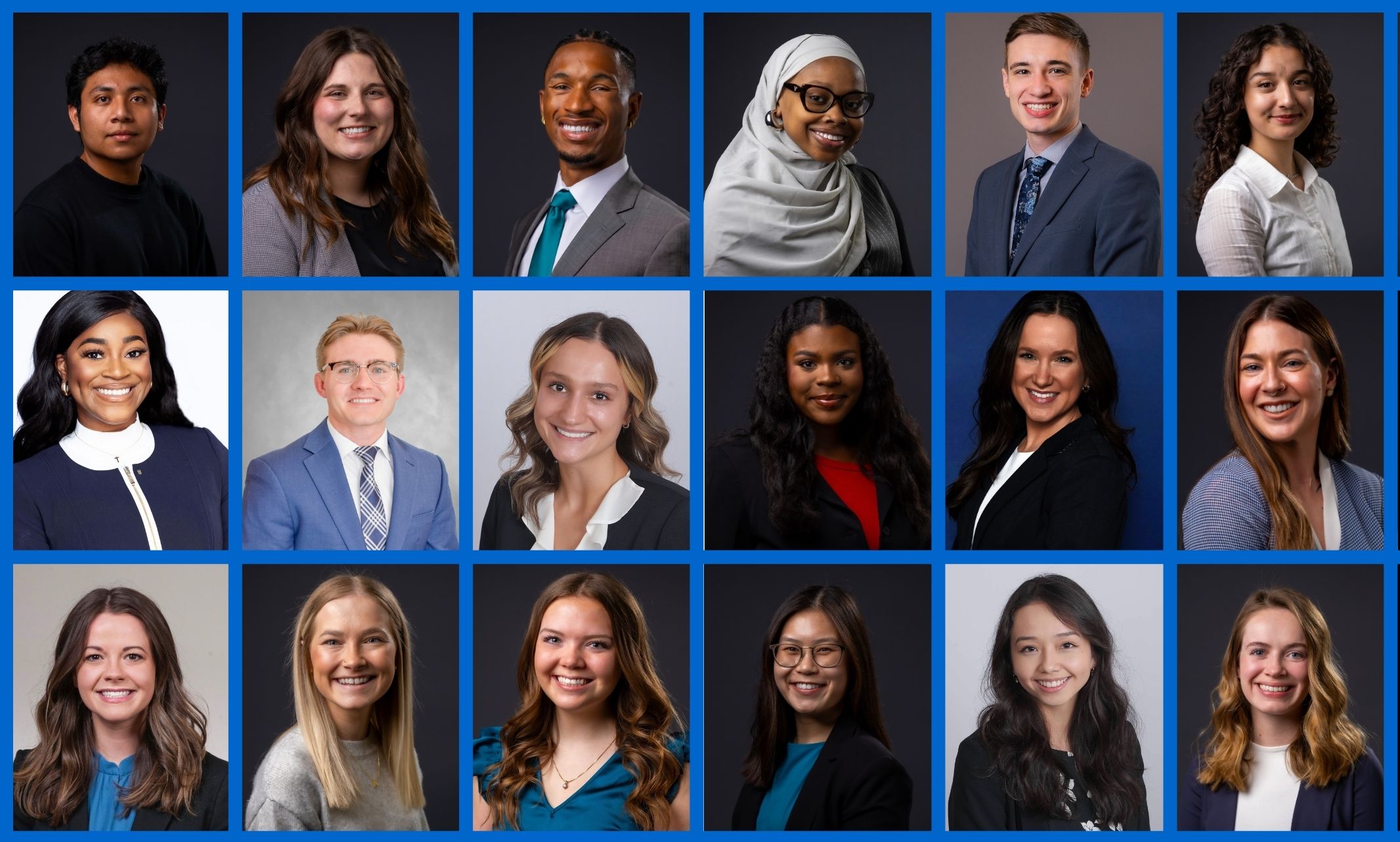
Graduating students are recognized for their outstanding academics, leadership and service
Eighteen UMKC students have been named Dean of Students Honor Recipients in recognition of their accomplishments on campus and in the community.
Every semester, exceptional graduating students are honored with this designation. These students maintain excellent academic standards while actively participating in university activities and community service outside of the classroom.
The Spring 2024 honorees’ accomplishments include founding multiple medical interest groups, acting as president of the African Student Association, serving a national role in the American Student Dental Association, revitalizing the rooftop gardens at UMKC and more. These students have contributed numerous volunteer hours in the community with organizations such as Operation Breakthrough, Team Smile, Uzazi Village, Harvesters’, Morning Glory, Girls on the Run and Hope House.
Michele D. Smith, Ph.D., vice provost for student affairs and dean of students, expressed her excitement about the students' achievements.
“These students truly represent what it means to be a Roo through their commitment to academics, service and community. We are delighted to acknowledge their numerous achievements and are eager to see the great futures they have ahead of them.”
Students shared reflections on their time at UMKC at a breakfast celebration in their honor. Some excerpts:
Alyssa O’Brien: “I am a non-traditional student, and I never had the “college experience.” When I came to UMKC to pursue my graduate degree, I really wanted to find my sense of community. Getting involved on and off campus with different organizations has been incredibly impactful for my professional and personal development. My proudest accomplishment was taking a summer internship with the Federal Public Defenders Office of Western Missouri in the Capital Habeus Unit. Although challenging, this was some of the proudest work I have done in my life.”
Chandler Hill: “More than just a place of learning, UMKC has been a catalyst for growth and transformation. From undergrad to dental school, there have been many dedicated faculty and like-minded peers who have played an important role in my experiences and accomplishments. UMKC has encouraged me to think critically, embrace diversity and strive for excellence in all endeavors. My proudest accomplishment at UMKC is not just the grades or accolades, but the relationships I've formed and the impact I've been able to make. My involvement in the UMKC Chapter of the American Student Dental Association (ASDA) helped to develop my passion for advocating for others and leaving a lasting positive impact on both the campus community and beyond.”
Elaine Nikolov: “When I began the six-year B.A./M.D. program, I had no idea the plethora of opportunities that this school would offer me. My fourth year in the program, I began to work every Saturday morning in a clinic serving the homeless and under/uninsured of Kansas City. There, I formed life-long bonds with my fellow students and future colleagues as we worked to provide adequate care to a patient population that has historically been marginalized in medicine. More importantly, the patients I have met and been graced to care for have taught me skills and techniques that no textbook could ever teach. I was taught what true understanding, compassion and patience meant and how I could better provide not only medical care but also humanity to those in need.”
Congratulations to the Spring 2024 Dean of Students Honor Recipients!
Kennison Adams, School of Medicine
Chynna Burton, School of Medicine
Victoria Cegielski, School of Medicine
Allison Eppenauer, School of Pharmacy
Tiana Ford, School of Science and Engineering
Mary Gipson, School of Science and Engineering
Dylan Hailey, School of Medicine
Ashley Hanners, School of Nursing and Health Studies
Chandler Hill, School of Dentistry
Hannah Leyva, School of Humanities and Social Sciences
Davis McCallister, School of Dentistry
Elaine Nikolov, School of Medicine
Alyssa O’Brien, School of Education, Social Work and Psychological Sciences
Dumebi Okocha, School of Medicine
Maryam Oyebamiji, School of Science and Engineering
Rhiannen Schneider, School of Law
Andrew Thompkins, School of Dentistry
Harry Vasquez, School of Science and Engineering
May 10, 2024
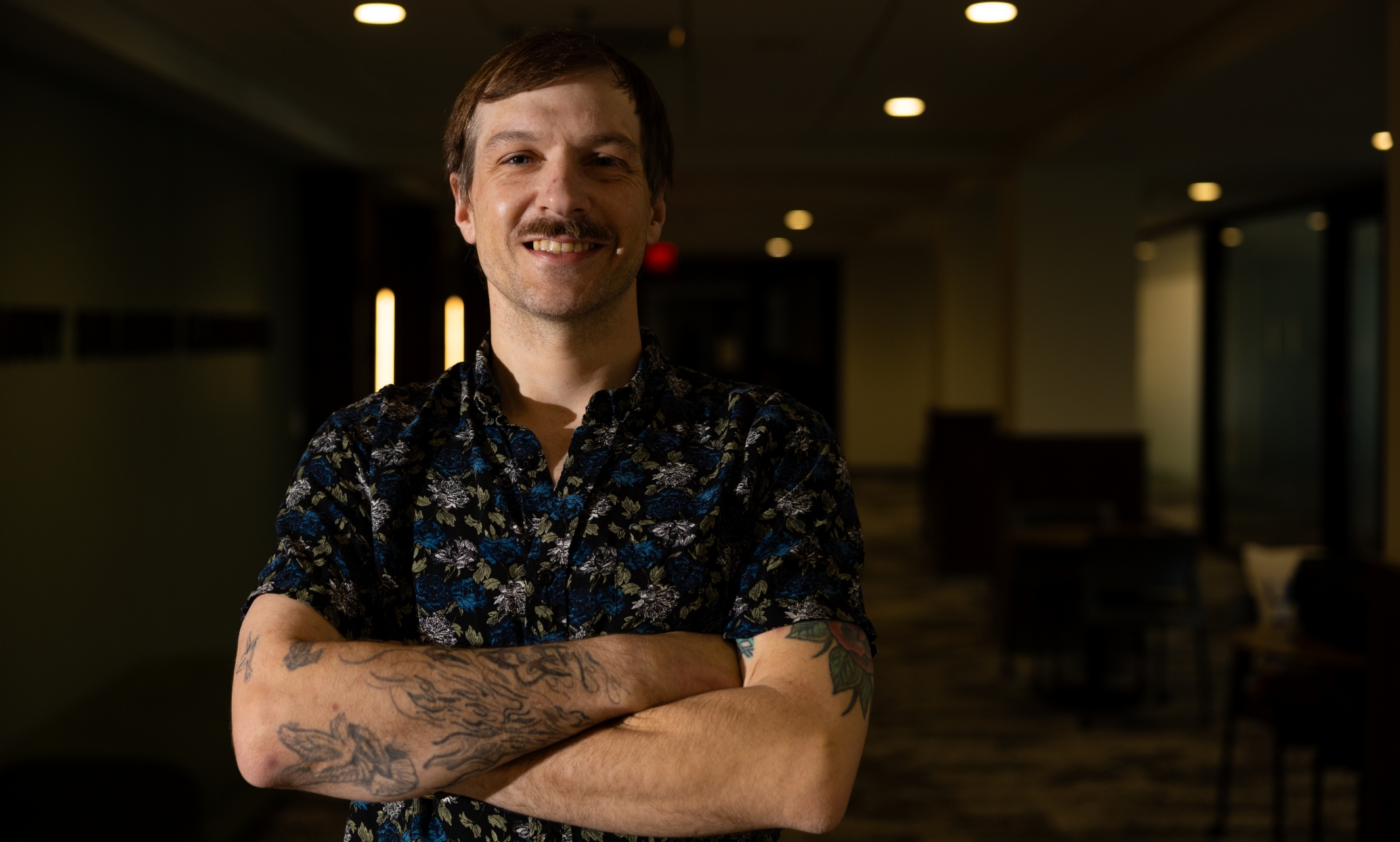
Cody Truitt has just one regret; not knowing about the program sooner
Imagine not paying a dime for your senior year of college.
That’s the case for Cody Truitt, a senior in accounting who took advantage of the Amazon Career Choice Program at the University of Missouri-Kansas City, which offers tuition assistance to Amazon employees.
Truitt had started his undergraduate degree a couple of times through the years, but each time, life had gotten in the way. During COVID, he resolved to finish it and enrolled at UMKC because of its convenience, value and ease of transferring.
“It just fit perfectly,” Truitt said.
He knew he would do whatever it took to complete his degree, whether it meant working overnights or overtime to pay for school. He got a job at Amazon to earn extra money, where he soon learned about the career choice program.
“Amazon rocks because they paid for the entirety of my senior year,” Truitt said. “I only wish I had discovered this as a freshman.”
At first, Truitt admitted he was skeptical it may be too good to be true, but to his surprise, the process was simple.
“I figured there were going to be some hoops to jump through, that it wouldn't really work, there'd be some fine print somewhere,” Truitt said. “The moment that I noticed that it worked out, when I checked my UMKC account for what I owed for the semester and I saw $0, I was extremely elated.”
Thanks to Amazon paying his senior year, Truitt was able to take advantage of several opportunities that he may not otherwise have had time for. He did internships at Creative Planning and Bergan KDV.
The extra time didn’t just help Truitt, he was also able to give back through the Volunteer Income Tax Assistance Program, where accounting students provide income tax assistance to the community.
Cody Truitt (top row, left) with fellow VITA volunteers
“It was really great experience because there’s just all sorts of different people from the community,” Truitt said. “We are dealing with people who are disabled, people that are just really, really nervous about their taxes and they come in so shaken up about it and they're able to leave with a smile and, sometimes, a couple dollars coming to them.”
For Truitt, being able to take advantage of these opportunities and persevere was especially meaningful.
“I had a lot of times when I was really struggling in school and I really was barely making it some semesters and just putting in the effort and doing my best and getting through it,” Truitt said. “I realized a lot of the time, I'd end up with better grades than I thought… and every time that happened, I realized I was more capable than I had thought I was before.”
He has some advice for students who may be experiencing challenges in school or in life.
“Take a step back and deep breath and realize that as long as you don't give up, you will get there,” he said.
Truitt is starting a new job soon. The May 2024 graduate has a job lined up as a staff accountant with Allen, Gibbs & Houlik, a certified public accounting firm in Overland Park, KS.
“I'm looking forward to walking across the stage,” Truitt said. “I've worked really hard to get to where I'm at. I know I've improved a lot over the last few years, just as a person, as a student and a professional, so I'm excited to see what the future holds.”
After graduation, Truitt plans to take a few more courses to sit for the CPA exam, then return to school to get a Master of Business Administration degree.
Learn more about Amazon Career Choice Program
May 08, 2024

21st-century discovery to mitigate destruction
It was 3:03 a.m., February 4, 1976. While Guatemala’s citizens slept, the country’s massive Motagua Fault ruptured. In 39 seconds, the resulting 7.5 magnitude earthquake had devastated this Central American nation.
Nearly five decades later, a research team from University of Missouri-Kansas City, in collaboration with U.S. and Guatemalan partners, is investigating the country’s extensive geohazards, including the Motagua Fault.
An International Investigation
The Guatemala GeoHazards International Research Experiences for Students was launched in early January 2023. A long-term vision of director Tina Niemi, this three-year program gained funding in late 2022 from the National Science Foundation.
“Understanding the seismic potential of Guatemala’s active fault systems and volcanic history are key goals of the program,” said Niemi, Ph.D., professor of geology and a Curators’ Distinguished Teaching Professor. “This year, we investigated the earthquake history of the Motagua Fault.”
The 2023 Guatemala Geohazards field team included 10 U.S. and Guatemalan students, three faculty mentors from UMKC and the University of Missouri, two Guatemalan faculty and one industry mentor.
During this inaugural International Research Experiences for Students program, the group conducted research across several disciplines of geoscience, including volcanology, paleoseismology, surficial processes and geospatial data science. Together, the cohort completed three and a half weeks of field research in Guatemala, followed by a break for preliminary analysis and sample processing. In May, the group reconvened for two weeks of lab work and data analyses at at UMKC and virtually.
“Through this program, students receive an authentic research experience that includes mentorship by faculty from the U.S. and our partner universities in Guatemala,” Niemi said. “They not only increase their scientific inquiry and research skills but practice international collaboration.”
The International Research Experiences for Students faculty are all specialists in geology fields, including the study of Guatemala’s geohazards. With guidance from their mentors, the students collaborate in the scientific process. They develop questions, collect, analyze and interpret data and then present that data.
They also navigate the challenges of international field research.
“These are not controlled experiences,” Niemi said. “There are many uncertainties, such as access permission, weather conditions and malfunctioning equipment, to name a few. Field research requires flexibility and adaptation to the conditions — all valuable life skills.”
Aleigha Dollens (B.S. ’24) participated in the inaugural geohazards program to gain field experience that augments her classwork.
“I worked closely with mentors and learned hands-on how to do research,” said Dollens, whose own research focuses on geophysical imaging of the subsurface of the Motagua Fault.
“I was in a small research group where I asked questions and received feedback from the program’s professors. I’m now more confident in my ability to practice research and in myself as a person.”
Guatemala’s Geohazard Vulnerability
Ranked fourth globally for geohazard disaster risk, Guatemala is continuously exposed to multiple hazards, including earthquakes, volcanic eruptions, landslides, floods and storms. These geohazards threaten countless lives, environmental stability and economic infrastructure.
The 1976 Motagua earthquake, one of innumerable Guatemalan natural disasters, resulted in 23,000 deaths and 74,000 injuries. One million people were displaced — nearly one-fifth of Guatemala’s population at the time. Thousands of aftershocks exacerbated the destruction and resulted in economic damages estimated at 17.9% of the country’s gross domestic product.
These geohazards do not always occur independently, and interactions between hazards often trigger multiple secondary hazards. In recent years, new geohazards have emerged in Guatemala, while existing hazards have intensified.
Omar Beltetón, Ph.D., a professor and researcher at the Higher Studies Center for Energy and Mines and an engineering faculty member at the University of San Carlos, believes information and insight from the UMKC collaboration and investigation will contribute to Guatemala’s development of strategic geohazard resilience.
“Subsidence and sinkholes have formed in streets or highways and caused the collapse of storm drainage pipes,” said Beltetón, an International Research Experiences for Students faculty member from Guatemala. “These are consequences of climate change and urban flooding because of inadequate infrastructure design. Road collapse and landslides in mountainous areas are the result of deforestation and the consequent erosion."
“This research is significant because of our country’s geographic and tectonic setting. The Guatemalan people haven’t been able to escape the suffering from geohazards, including loss of life, infrastructure damage and economic loss. We must try to understand the phenomena to avoid these losses.”
Exploring With 21st-Century Technology
The Guatemala GeoHazards program uniquely utilizes both traditional geologic field mapping and cutting-edge technology, such as LiDAR (Light Detection and Ranging) drone imaging.
Small but mighty, LiDAR drones are valuable research partners.
“The basic approaches for investigating geohazards have been established for some time, but a significant limitation has been observational capability,” said Francisco Gomez, Ph.D., geological sciences professor at the University of Missouri and the UMKC program’s surficial processes research team mentor. “New technologies provide us with unprecedented views of the earth to push our investigation further.”
“As recently as 25–30 years years ago, earthquake investigations and landslide mapping primarily involved traditional terrestrial surveying. Though accurate, these methods are time-consuming and expensive. Today, unmanned aerial systems provide higher resolution information at a much lower cost. Also, drone images allow us to see subtle tectonic features not otherwise easily visible. It’s a game-changer we could only dream about previously.”
These advancements yield significant, beneficial data about geohazards.
“Some of the most exciting results come from interpretation of the LiDAR data we acquired across the 1976 earthquake rupture trace,” said Niemi, who is a Quaternary geologist specializing in geoarchaeology, sedimentology and active tectonics. “We identified features revealing accumulative offset that can be used to determine the fault’s slip rate. Slip rate is a critical parameter in seismic hazard assessment.”
Mitigation Insights and Strategies
The potential for this research is far-reaching — and sharing the results with other scientists and organizations in Guatemala is a vital component of the work.
“While our number one goal is to educate the next generation in geohazard research, the data we collect have profound significance in defining the occurrence or repeat time of earthquakes and volcanic eruptions,” Niemi said. “Key parameters for seismic and volcanic hazards collected through the program are essential to government preparedness plans and mitigation strategies.
“For example, our volcanology research team began mapping pyroclastic flow deposits from the Chocoyos volcano that occurred 75,000 years ago. This research is the first step to help better constrain future volcanic hazards.”
In Guatemala, the program’s research is in collaboration with the University of San Carlos de Guatemala’s Center for Higher Studies of Energy and Mines and the Centro Universitario del Norte’s Department of Geology. Information from the program can be incorporated in the National Seismic Design Code, which specifies structural safety standards and guidelines for reinforcing existing works.
Results will also be shared with the Guatemalan Association of Structural and Seismic Engineering, the National Coordinator for Disaster Reduction and the Institute of Seismology, Volcanology, Meteorology and Hydrology — the primary governmental institution that monitors geological hazards.
“Our collaboration with UMKC helps us to understand geohazard phenomena in a way that action can be taken to help minimize their impact and help ensure that losses and damage are minimal,” Beltetón said. “The investigation establishes possible danger zones for geohazard threats and the feasibility of building on specific sites. The research also guides the preparation of hazard maps and is a tool for territorial ordering, a mode of land-use planning with an emphasis on conservation.”
Looking to the Future
At the conclusion of the International Research Experiences for Students Program, student participants wrote a scientific abstract and presented their findings at the UMKC’s Guatemala GeoHazards poster symposium. Some will also present their research at this year’s annual meetings of the Association of Environmental and Engineering Geologists (AEG) and the Geological Society of America.
Dollens is one of the students who will present at the AEG conference.
“This program has inspired me to get my master's degree at UMKC and kickstarted my research skills and career as a professional. I’ll always be grateful for the opportunity to work on this project and for the relationships I built with the team,” said Dollens, recipient of a 2023 Summer Undergraduate Research Opportunity award.
She was also awarded the prestigious 2023 Richard Hay Award from the Geological Society of America for her research on evidence of earthquakes at the Quirigua archaeological site in Guatemala. A full circle moment, Niemi was the first recipient of this award 34 years earlier.
These collaborative connections made today and for the future are integral to Niemi’s vision for the program.
“Research is the exploration of the unknown,” Niemi said. “The shared experience of students and mentors exploring geology in the field provides a unique setting that emphasizes inquiry and builds confidence. In this rich learning environment, students observe mentors from different countries discussing geology and modeling the fundamental first step in research — asking questions.
“We’re dedicated to educating the next generation of scientists, diversifying the workforce and promoting societally relevant research that can be translated into solutions.”
May 07, 2024

The six-year B.A./M.D. student is jumpstarting her career through the Royals and MLB
Emmanuella Alawode, Dallas native and fourth-year student in the B.A./M.D program is a Jackie Robinson Scholar. Through this program, Alawode not only gets to participate in career-readiness opportunities, but also receives support from the Kansas City Royals Foundation. The Royals are a UMKC partner. An extra special perk of the program? She got to throw out the first pitch at UMKC Night at The K last month.
Why did you choose UMKC?
I knew I wanted to become a doctor, so I talked to a lot of my mentors and people who also went through the accelerated B.A./M.D. program that saves two years off of the traditional undergraduate and medical-school path. That just reassured me that UMKC was an excellent choice. I really liked the six-year program knowing that I can get a jumpstart with my career. And it is not too far from home.
Why did you choose your field of study?
Growing up, I just really enjoyed science, anatomy dissections, experiments and research. My experience at UT Southwestern in a high school camp was pivotal for me and exposed me to clinical research. I shadowed a breast surgeon and became interested in women’s health. Something else that has shaped my interest in health disparities has been volunteering with my church and helping in their health clinic.
What are the challenges and benefits of the program?
There are a lot of learning curves along the way. Because you are going straight into med school after high school and are also juggling it with doing your undergraduate degrees. A key challenge was learning how I like to study now, and finding the best way to retain the volume of information.
The benefits are that we get early clinical exposure. You get to learn how to interview patients or just medical terminology in your first year. After your second year, you get white coated and get assigned a docent, and that is your docent for your remaining four years. You also get a senior partner, and they are there to guide you along the way. They can help answer questions and help you hone some of your clinical skills.
How has your college program inspired you?
It has gotten me interested in health-care policy advocacy. I’m also interested in how we can better shape medical education and make sure we are honing on helping students to master what they need to know for clinical practice, but also making sure that their mental and physical health does not deteriorate.
Are you a first-generation college student?
Yes. It means that I can hopefully inspire younger people who may not have had medical exposure or don't know what the journey and rigor of medical school. I didn’t know the demands of medical school before. But now, it means I can be a mentor for others and someone that others can look up to, and I love that.
Who do you admire most at UMKC ?
My docent, Dr. Gary Salzman, is my favorite person at UMKC. I like the way that he interacts with patients. Every time we come into the room, the patients are like “‘there’s my favorite doctor!”’ He is always looking out for the best interests of the patients.
Do you have other scholarships in addition to the Jackie Robinson Scholarhip?
Another one that I have received is the UNCF STEM scholarship. Both the Jackie Robinson scholarship and the UNCF STEM scholarship hope to encourage students who are African American or another minority to pursue higher education. I am incredibly grateful for both of those scholarships.
Do you have any standout moments of the Jackie Robinson Scholarship experience?
I would say the love and the foundation have been the standout parts of my experience. When I was applying, I knew they have mentorship and support, but I did not expect the level of support I have since received. One alumni (of the Jackie Robinson scholarship program) purchased MacBooks for most of us, which is nice. Another memorable experience is the first pitch (at the Royals game) that I threw!
What other extracurricular activities are you involved in at UMKC?
Last year, I was the social chair for the student National Medical Association. I am the communications and social media manager for the Association of Women Surgeons. I have been an ambassador with the admissions office and am a member of the Surgical Interest Group. I am also a part of the American Medical Women’s Association and Her Campus as a writer.
What do you hope to take from your experiences at UMKC into your professional career?
I’ve been stretched in many ways that I never thought I could be stretched. The key is learning that you must always think outside of the box. Especially, as a future surgeon, I may not be able to approach a particular procedure the same way I do for another person. Also being flexible. Learning how to manage time wisely. The spirit of perseverance.
Emmanuella was also featured in local news coverage here.
May 02, 2024

Students participating in Enactus partnered with Operation Breakthrough to keep Kansas City families on the road
Reliable transportation can be a domino that holds a family’s opportunities together. It can be the difference between someone getting to work, holding a job and being able to access much-needed resources. With their latest project, Stay Driven, UMKC Enactus sought to help families in need, while making Kansas City their classroom.
During summer 2023, students had the opportunity to visit Operation Breakthrough, a nationally accredited not-for-profit in Kansas City that offers childcare, education and wrap-around services for families in need. While there, staff explained the need for families to have reliable transportation and the difference having it can make on their lives.
“Using public transportation to get to a job can take upwards of 90 minutes each way for working parents,” said Mary Esselman, president and CEO at Operation Breakthrough. “Having reliable transportation allows people to get to those jobs that also have things like benefits and paid time off.”
Ga Ji Wang, a Bloch student with seven years of automotive experience in the Kansas City area, recognized the need to solve this problem. Wang came up with the idea to offer families a car-care clinic.
“Having the working background and skillset that I do, I knew we could find a way to make a difference,” said Wang, a senior studying business administration with an emphasis in entrepreneurship. “Doing something as simple as an oil change can make a big difference in keeping a car on the road.”
The team began work on their Stay Driven project at the start of the spring semester. Together, they worked to recruit volunteer mechanics, manage inventory, plan for the event and coordinate with the staff at Operation Breakthrough. The team also needed to secure funding for their project, which inspired them to turn to UMKC Giving Day.
"Enactus always bootstraps projects through spring fundraising campaigns and the timing was perfect for us to tailor our Giving Day campaign to Stay Driven,” said Imani Lemon, president of UMKC Enactus. “Our theme centered around people donating just $5, which would help cover the cost of oil, a windshield wiper or a light bulb.”
By taking part in Giving Day, the Enactus team was able to raise nearly $1,300, which covered the cost of supplies for Stay Driven. The team was also able to secure donated parts and supplies, as well as help from volunteer mechanics.
On April 5, UMKC Enactus held the Stay Driven event at Operation Breakthrough, helping families receive minor repairs like oil changes, headlight replacement, battery replacement, securing bumpers with zip ties and fluids top offs. In total, they helped 29 families, saving them $3,000 in repair costs.
Sixteen Enactus volunteers participated in the event including Wang, who once again found himself working under the hood. By doing so, he was able to see the difference the team was making first-hand.
“Many of the cars were low on oil and you could already see the damage being caused,” Wang said. “We helped keep multiple cars on the road by simply performing that routine oil change.”
For UMKC Enactus, Stay Driven is anything but a one hit wonder. The team hopes to bring the event back, potentially with help of other Kansas City students taking part in Operation Breakthrough’s Ignition Lab.
“Allowing them to participate in performing minor repairs gives them invaluable experience as they work toward their future,”Esselman said. “Our team and the families who participated in Stay Driven were blown away and we’re excited to continue to support this event and UMKC Enactus.”
May 02, 2024

New UMKC program provides path to dental degree in the United States
Nine dentists from as far away as Cuba and India will begin their dream of practicing in the United States at the UMKC School of Dentistry thanks to a new program at the school.
The advanced standing dental education program, launched at the school in January, will enable these practitioners and all those who follow them in the program to work as dentists in the United States. Without programs like this, dentists from other countries face limited options to practice oral health care in the U.S.
“It’s going to be a life-changing opportunity for these students,” said Gustavo Leal, interim director of the advanced standing program. “These students are fighters who have been working hard to achieve this dream.”
The advanced standing students will finish their dental degree in 2 1/2 years, compared to students in the traditional degree program, who attend school for four years. The shorter timeline condenses two years of coursework into six months, and includes labs, lectures, pre-clinic skills training and exposure to different disciplines. According to Leal, students in the program proved in their skill tests and board exams that they had the knowledge base and skills to handle the accelerated timeline.
The students will join the existing third-year students in the fall of 2024, following the same timeline the next two years. The first cohort of nine students began the program in January and are slated to graduate in May 2027.
According to Dean Steven Haas, around 2010, dental schools started to open avenues for internationally trained dentists, enabling them to avoid the burden of going back to school for an additional four years. With 93 such programs in the United States, UMKC is one of many universities offering a similar path to practicing in the United States. The demand for the program speaks for itself. UMKC received 380 applications for the nine spots available in its first class.
For Haas, these practitioners represent a critical influx of oral health care providers who can address the shortage of oral health care providers in Missouri, where 111 counties are considered underserved, according to the Rural Health Information Hub. Haas said that Dekalb County in northwest Missouri has only one dentist for 10,480 people.
“We know that we need dentists in these rural areas,” Haas said. “By opening up our classes to internationally trained dentists, we’re able to get more oral health care providers out there.”
All third- and fourth-year students complete rotations in a variety of settings, including rural dental clinics.Haas said that it’s important that the program diversify the oral health care workforce as well.
“Our population is changing,” Haas said. By 2050 or 2060, our population will look a lot different. I think dentistry should mirror that demographic shift.”
Haas said that current students will benefit from the infusion of this geographically diverse group of students.
For advanced student Flavia Santos Bada, the program will enable her to practice in the U.S. and help support her family, especially her father, who needs specialized medical care.
Originally from Cuba, Bada immigrated to the United States in 2018 after graduating from dental school there. She joined her parents and sister, who had moved to the U.S. for better medical care for Bada’s father, who has amyotrophic lateral sclerosis (ALS).
Family is important to her, and UMKC is a good fit.
“The school’s focus on putting patients first captured my attention,” Bada said. “I want to treat people, not just as my patients, as if they were my family.”
For Hadrik Patel, UMKC’s Midwestern location was critical in his decision to apply to the advanced standing program. Originally from India, he was practicing as a dental assistant in Nebraska. He said he was already comfortable in the Midwest, so when UMKC’s program opened up, he immediately applied.
His first few months in the program have confirmed his excitement for the school.
“What has stood out is how many of the faculty are UMKC alumni,” Patel said. “I think that says a lot about the school. They wanted to come back to UMKC to ensure students achieve the same success they have.”
According to Leal, the program introduces more diversity into the student body, providing them with a much different perspective at a personal level as well as professional level. The advanced practice students have worked in the field and provide expertise to current students.
“I am excited to see their progression and how they incorporate themselves with the other dental students,” Leal said. “It’s a great opportunity for our students to grow while providing an opportunity for these practitioners to achieve their dreams.”
May 01, 2024
